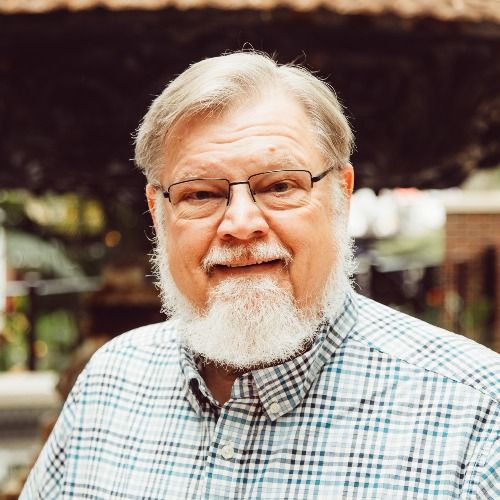Episode 863
The Complex Emotions of Betrayal in the Gospel of John
The "Daily Bible Refresh" is presented each day by Rev. Dr. Brad Miller who has a goal of speaking a bit of the bible into two million ears (one million people) in three years (2025-2028).
He is the author of "The A, B, C-1,2,3 Bible Study Guide" Free to you by clicking HERE.
Brad served as a local church pastor for forty years and has a background in radio and podcasting. Moreover, he is a life-long student of The Bible.
He believes in the words of Jesus that “scripture is fulfilled in your hearing” (Luke 4:21)
The "Daily Bible Refresh" is available seven days a week by 6:00 am ET. The episodes are no longer than ten minutes long and are...
- Understandable: A reading from the New Testament (usually the Gospel) selected from the Revised Common Lectionary using "The Message" translation.
- Relatable: You will have a couple of "points to ponder" from the text which will relate to your life
- Applicable: Every episode includes a way you can take action based on the reading
- A recommended resource to help you go deeper in biblical study and spiritual direction.
- A prayer for your day.
A companion resource to the Voice of God Daily Podcast is the “ABC Bible Study Guide” available by clicking HERE.
The "Daily Bible Refresh" is available every day at VoiceofGodDaily.com on Apple Podcasts, Spotify and all major podcast directories.
You can help Dr. Brad attain his goal of getting a bit of the bible into two million ears by subscribing to "Daily Bible Refresh" on Apple Podcasts, leaving a five-star rating, and writing a review. More importantly please share with your network of family and friends about the "Daily Bible Refresh".
Please make listening to the "Daily Bible Refresh" a part of your daily life.
Remember… “All scripture is God-breathed and useful”(2 Timothy 3:16)
The account provided in John 13:21-32 serves as a compelling exploration of the humanity of Jesus, particularly as He navigates the painful reality of betrayal. As He reveals the impending betrayal to His disciples, His emotional distress underscores the very real human experiences of pain and sorrow. This moment not only highlights Jesus's relational depth but also serves as a poignant reminder of the complexities that arise within human connections, particularly in times of crisis.
Furthermore, the discussion invites a critical analysis of Judas's role in the narrative, positioning his betrayal within the framework of systemic influences. Rather than merely demonizing Judas, this examination encourages an understanding of how economic and social pressures can lead individuals to compromise their values. Reflecting on this theme allows us to confront our own complicity in societal systems that may perpetuate harm, challenging us to assess our choices and their alignment with our moral convictions.
Additionally, the mention of darkness in the passage provides a rich metaphor for transformation. Darkness is portrayed not simply as a backdrop for evil but as a fertile ground for growth, suggesting that our most profound developments can occur during challenging times. This perspective fosters a more holistic understanding of the human experience, wherein light and shadow coexist, ultimately guiding us towards paths of personal integrity and community solidarity.
Takeaways:
- In this podcast episode, we explore the profound humanity of Jesus as depicted in the Gospel of John, emphasizing his emotional experiences and vulnerabilities.
- The narrative illustrates the complexity of betrayal, challenging listeners to reflect upon their own relationships and the dynamics within community settings.
- We are invited to consider the influence of systemic power and privilege on personal choices, particularly in the context of Judas' betrayal.
- The darkness mentioned in the text serves as a poignant metaphor for transformation, suggesting that growth often occurs in our most challenging moments.
- Practicing radical honesty about our own capacity for betrayal is essential for personal integrity and ethical living.
- The discussion encourages us to examine our consumption habits and financial choices, highlighting the importance of aligning our actions with our values.
Links referenced in this episode:
Transcript
Brad Miller.
Speaker A:Hello good people.
Speaker A:Welcome to Daily Bible Refresh with Dr.
Speaker A:Brad Miller.
Speaker A: on years, a million people by: Speaker A:We do that by daily reading of the Scriptures.
Speaker A:We use the Revised Common Lectionary.
Speaker A:We're in year C and this is Holy Week in the Lenten season and we give you some readings that are understandable because we use the Message version of the New Testament Relatable.
Speaker A:We give you some points to ponder, to think about.
Speaker A:Applicable will give you an action step.
Speaker A:We have a prayer.
Speaker A:We do all of that in under 10 minutes or so and it's all brought to you by our website, voiceofgodaily.com that's the home of the ABC 1, 2, 3 Bible study method.
Speaker A:Here's our reading for the day.
Speaker A: John: Speaker A:The disciples looked around at each other, wondering who on earth he was talking about.
Speaker A:One of the disciples, the one Jesus dearly loved dearly, was reclining against him, his head on his shoulder, and Peter motioned to him to ask who Jesus might be talking about.
Speaker A:So being the closest, he said, master, who?
Speaker A:Jesus said, the one to whom I give this crust of bread after I've dipped it.
Speaker A:Then he dipped the crust and gave it to Judas, son of Simon the Iscariot.
Speaker A:As soon as the bread was in his hand, Satan entered him.
Speaker A:What you must do, said Jesus, do.
Speaker A:Do it and get it over with.
Speaker A:No one around the supper table knew why he said this to him.
Speaker A:Some thought that since Judas was their treasure, Jesus was telling him to buy what they needed for the feast, or that he should give something to the poor Judas with the piece of bread left, it was night, a new command.
Speaker A:When he had left, Jesus said, now the Son of Man is seen for who he is, and God seen for who he is in him.
Speaker A:The moment God is seen in him, God's glory will be on display in glorifying him.
Speaker A:He himself is glorified.
Speaker A:Glory all around.
Speaker A:Well, incredible story from the Passion Week.
Speaker A:And this deeply human moment in John's Gospel speaks about very, very many human emotions betrayal, community dynamics in the group, and the complexity of human relationships.
Speaker A:Let's talk about it in terms of a few points to ponder.
Speaker A:Number one is about the humanity of Jesus.
Speaker A:The passage says that Jesus was visibly upset.
Speaker A:That's a powerful reminder of Jesus full humanity.
Speaker A:Progressive Christianity embraces this human Jesus who experiences emotional pain and vulnerability rather than an untouchable divine figure.
Speaker A:Rather, we see someone who feels deeply, builds close relationships and experiences, yes, betrayal.
Speaker A:This invites us to embrace our own emotional parts of ourselves as sacred and to find divine presence even in vulnerability.
Speaker A:A second point has to do with a system of power and choices.
Speaker A:Rather than simply demonizing Judas through the reference to Satan, we might consider how the systems of power and privilege and oppression influence human choices.
Speaker A:As treasurer Judas was enmeshed in economic systems.
Speaker A:His betrayal invites us to examine how money, power and institutional pressure can lead any of us to betray our values and our community.
Speaker A:What systems today corrupt us to choose profit over people?
Speaker A:A third point is about transforming darkness in the Bible.
Speaker A:In the text it says it was night.
Speaker A:A detail is sometimes interpreted simplistically as evil, a kind of a metaphor for evil.
Speaker A:But what if this darkness represents the space where transformation happens?
Speaker A:Just as seeds germinate in dark soil, sometimes our most profound growth occurs in our darkest moments.
Speaker A:This reframes the story from a simple good versus evil type of narrative to more nuanced exploration of how light and shadow work in integrated fashion in the human experience.
Speaker A:Let's talk about an action step this week.
Speaker A:I really want you to consider practicing radical honesty about your own capacity for things like betrayal.
Speaker A:Identify one way you might be complicit in systems that harm other people, perhaps through your consumption habits or your financial choices, or silence.
Speaker A:When you see injustice happening, then take some concrete step towards greater personal integrity.
Speaker A:This might mean changing where you bank, or changing where you send your money, or examining how and what you purchase things, or speaking up against some institutional harm.
Speaker A:Remember, the acknowledgment of our shadow side can lead to transformation.
Speaker A:We're going to pray in just a moment.
Speaker A:I did want to just let you know that transportation takes place in many ways.
Speaker A:One of them is the audible word of God, which you get here on Daily Bible Refresh.
Speaker A:But one is when you read and consume and study the Word itself.
Speaker A:So I want you to do that on your own.
Speaker A:So we're providing for you a resource.
Speaker A:It's called the ABC 123 Bible Study Guide.
Speaker A:You head on over to our website, voiceofgodddaily.com that's where you can pick it up.
Speaker A:It will help you in your personal Bible study.
Speaker A:Let's pray.
Speaker A:Oh God, you are a divine presence and who knows what it means?
Speaker A:Who knows what it means to be betrayed?
Speaker A:Be with us in our complicated human moments when we feel pain, Help us remember that you have felt emotional anguish.
Speaker A:When we're tempted to oversimplify, stories of good and evil remind us of the complex systems that shape human choices.
Speaker A:Give us courage to examine our own capacity for betrayal and the wisdom to transform it into opportunity for growth.
Speaker A:Thank you for showing us that even our darkest moments can become doorways to transformation.
Speaker A:Help us build communities where honest vulnerability is welcome, where no one feels pressure to betray their values.
Speaker A:In the spirit of Jesus who knew both betrayal and deep friendship, we pray.
Speaker A:Amen.
Speaker A:My prayer for you is that you will join me again tomorrow here on Daily Bible Refresh as we continue our quest to put the audible word of God into 2 million ears.
Speaker A: A million people by: Speaker A:You can help by joining me tomorrow and bring a friend this next time.
Speaker A:Remember, remember, we're here every day.
Speaker A:We usually drop our episodes before 6am Eastern Time.
Speaker A:Hope that you join us.
Speaker A:My name is Dr.
Speaker A:Brad Miller.
Speaker A:Until tomorrow.
Speaker A:Remember that God's loyal love doesn't run out.
Speaker A:His merciful love hasn't dried up, it's created new every morning.
Speaker A:Sa.



